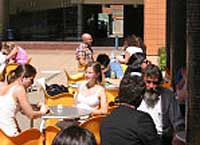|
 |
|
 |
| |
| |
| |
| |
| |
| |
| |
Campus: Kensington Campus
| |
| |
Career: Postgraduate
| |
| |
Units of Credit: 6
| |
| |
| |
| |
Indicative Contact Hours per Week: 4
| |
| |
Enrolment Requirements:
| |
| |
Prerequisite: LAWS1001; JURD7101
| |
| |
Excluded: LAWS2311
| |
| |
| |
| |
| |
| |
| |
 |
|
 |
Description
Litigation 1 introduces students to the rules and practices governing the major court-supervised processes which are typically involved in litigation. The course addresses the social policies which underlie the rules as well as their practical operation. Litigation 1 deals principally with the pre-trial phase of both civil and criminal litigation. In the latter area it builds on knowledge developed in Criminal Law.
Recommended Prior Knowledge
None
Course Objectives
- To establish a basic knowledge of the doctrine, principles and rules relating to pre-trial procedure in both civil and criminal litigation. Students will be provided with structured opportunities to acquire a functioning and contextual knowledge of law and legal institutions and intellectual skills of analysis, synthesis, critical judgment, reflection and evaluation
- To foster personal and professional values gained from an understanding and sensitivity to a variety of related ethical, social, economic, political and justice issues affecting the formal resolution of criminal and civil matters
- To foster students' critical analytical skills and enhance their understanding from a social justice orientation of pre-trial related practice issues
- To provide students with the opportunity to actively engage in the learning experience through classroom discussions. This enhances their ability to critically evaluate trial processes from legal and social justice perspectives. It also enhances challenging their assumptions and beliefs
Main Topics
- Introduction to civil procedure, including the meaning of procedural law; features of an adversarial system of litigation; the principle of open justice; and, the principle of a fair trial.
- a discussion of the history and development of case management in NSW and the overriding purpose principles, obligations of parties and legal practitioners;
- costs: proportionality, the purpose of costs, costs against parties and legal practitioners, costs orders, security for costs as well as proposals for containing costs;
- alternatives to litigation;
- considerations to be taken into account before commencing proceedings including whether to commence proceedings, jurisdictional issues, cross-vesting, preliminary discovery, limitation periods, interim preservation orders such as search and freezing orders;
- joining parties and causes of action, Anshun estoppel, cross claims, and consolidation;
- initiating proceedings, appearance, general principles of pleading and service;
- amendments, mistakes in the naming of a party and adjournments;
- procedures that conclude proceedings before trial including summary disposal, default judgments and procedures that encourage settlement; and
- procedures for gathering information and evidence including discovery, notices to produce, interrogatories, subpoenas and admissions.
Criminal Procedure:
- Discussion of the relevance of criminal justice issues to the pre-trial process;
- Police powers to question and investigate prior to and after arrest;
- The legal principles governing arrest and the treatment of arrested persons or suspects prior to trial;
- The admissibility of confessional evidence;
- The legal principles governing the issue of warrants, in particular search warrants; and
- The legal principles governing the search of persons and premises.
Assessment
Mid-semester assessment (by way of exam or assignment) - 50%
Final exam - 50%
Class Participation 10% (maximizable) opt-in Course Texts
- Boniface D. and Kumar M. Principles of Civil Procedure in New South Wales, 2nd Edition (2012) Law Book Co.
- The Criminal Procedure part of the course will be covered in materials available for purchase through the UNSW bookshop. They can also be downloaded from the subject web site
Resources
Refer to Course Outline provided by lecturer.
|



